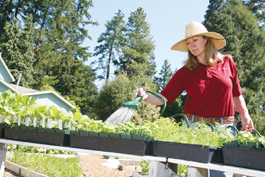home | metro santa cruz index | santa cruz county restaurants | review

Photograph by Carlie Statsky
Lady Farmer: One-half of the 'biodynamic duo' of Cynthia Sandberg and David Kinch waters seedlings at Love Apple Farm.
Flavor Intensive
The biodynamic magic of Love Apple Farm
By Christina Waters
Perhaps this is what Eden smelled like back in the beginning, when it was still a work in progress. Primal, musky, sweet and deeply familiar, the fragrant soil of Love Apple Farm is intoxicating. And productive.
"She grew the best tomatoes I'd ever tasted," says chef David Kinch of Cynthia Sandberg, the farm's matriarch. So compelling were the flavors of Sandberg's tomatoes that Kinch convinced her to grow vegetables exclusively for his restaurant. That was two years ago. Today the menu of Kinch's two-star Michelin-rated Manresa in downtown Los Gatos astonishes patrons with its exotic greens, edible flowers, microsprout garnishes and, of course, an array of heirloom tomatoes--all grown on Sandberg's Ben Lomond acres.
Exotic kales and mammoth artichokes line the far perimeter of these two productive acres. The long raised growing beds are punctuated by fruit trees and wheelbarrows. Two Australian sheep dogs trot along with me as I peek into a forest of flowering violas, nasturtiums, calendulas and peas. Decaying loam scents the warm air. Sandberg is a former attorney who gave up her Capitola practice and moved out to her sunny Ben Lomond compound more than 10 years ago. The garden grew, so to speak, from a few vegetables to a bonanza of tomatoes, and now includes exotics like red-ribbed sorrel, radicchio, frisée, leeks, fennel, ficoide glaciale, kohlrabi and cardoon. Kinch drops by often to check on the progress of some current pet vegetable or salad green, and several years ago the grower and the chef began undertaking the preparations involved in biodynamic practice. "I think of us as the biodynamic duo," Sandberg laughs, stooping to pull up a rogue seedling. "He's out here all the time to see what's coming along. He tastes everything."
Almost ready for Demeter certification, the farm is run according to the fastidious, self-sustaining "biodynamic" principles founded by Rudolph Steiner almost 100 years ago. Kinch likes to assist when Sandberg prepares the special esoteric soil amendments required for biodynamic status. Both chef and grower are convinced that superior results justify the intensive labor. "There's no such thing as waste on a biodynamic farm," Sandberg reminds me. "The restaurant itself is included in the loop. Even that bolted flower spike," she says, pointing at an overripe leek, "will become fabulous food for my bees and my chickens."
Mounds of mulch and compost waft intensely rich aromas into the noonday air. Scores of huge, golden buff cochin chickens provide the restaurant with fresh eggs, enrich the garden with manure and hang out with Sandberg's potbellied pig. The inquisitive fowl also power Sandberg's "chicken tractor." Two at a time the chickens forage--and fertilize--the raised beds from inside a portable mesh enclosure. Trimmings from the restaurant are reintroduced onto the farm as fuel for the steaming compost piles. Fava beans are both harvested and turned back into the soil. Everything is recycled and plays a role in energizing the soil.
Stopping in the center of the property, we consider the tomato shed, bulging with flats of seedlings, which are still the bread and butter of Sandberg's empire. Love Apple Farm truly earns its name from now through the end of the summer, to the delight of finicky growers who covet these plants. Behind us the 40-foot-long "hoop house," covered with a barrel ceiling of plastic but open at the sides, is jungly with edible flowers in bloom. "I didn't think I could have flowers this early," Sandberg admits. "But the hoop house has made it possible."
When I tell Sandberg that I want to live here, she just laughs. "That's what everybody says." A trio of young workers is busy weeding and loosening the soil. Another is planting a Mexican-theme garden. Interns from the UCSC agroecology program and from Cabrillo's horticulture program help out during the busy time, when the tomatoes threaten to take over every square inch not dedicated to raised beds. "I'm trying okra this year," Sandberg reveals. Who knew okra leaves and flowers were edible? "I always nudge David with new things," Sandberg notes with a satisfied grin.
In a tiny hot house entirely dedicated to embryonic sprouts of radish, basil, arugula, cilantro and beet, I am invited to sample plump, chewy sunflower sprouts. They taste like summer.
"David hasn't tasted those yet," Sandberg beams. "He's going to be surprised.
Send a letter to the editor about this story.
|
|
|
|
|
|